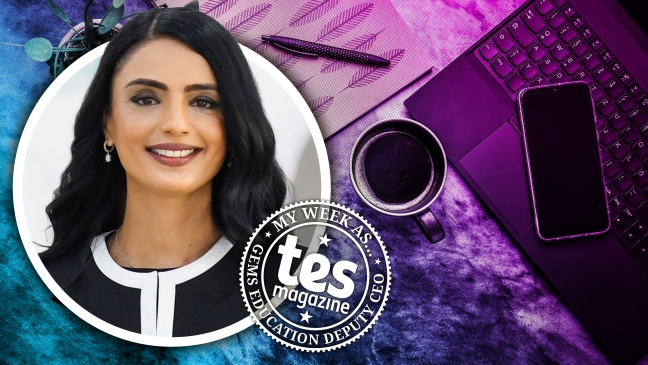- Home
- Leadership
- Strategy
- My week as...GEMS Education deputy CEO
My week as...GEMS Education deputy CEO

Dr Saima Rana is deputy chief executive officer of the international schools’ group GEMS Education - which has 46 schools in the Middle East - and the principal of GEMS World Academy, an International Baccalaureate school in Dubai.
Her career started as a teacher in a challenging area of London, with other roles including principal of Westminster Academy and senior educational consultant for Cambridge Education. She has worked for GEMS Education since 2020.
Her role spans day-to-day work with students, teachers and senior leaders, as well as strategic discussions on how the schools will change amid fast-moving educational technological developments.
She speaks with Tes about what her jobs entail and what she does during a typical week.
Morning routine
I bounce out of bed because I’m so excited for the day ahead - I love my job. I’ll look at emails, making sure nothing serious has come in that I have to action immediately.
Then I’ll get a telephone call from our founder, Mr Sunny Varkey, who will say, “Dr Rana, did you see this trend? Did you see this development?” And that’s when my strategic plan starts to align with the tasks of the day. He’s just so passionate about technology and education, which really motivates me and makes me want to rethink some of the things we’re doing.
I’ll have a green juice (celery, apple, spinach) and jump in the car - I’m very fortunate to have a driver - and it’s about 15 minutes to school. I pray on the journey, ask God to make it a good day, and arrive about 6.15am. I speak to my executive leadership team, then it’s time for door duty.
Greetings and interactions
At GEMS Academy I have roughly 2,200 children (117 nationalities), 800 parents and over 200 staff - more than 3,000 human beings to interact with every single day.
You must have a personalised interaction with each person you see - not just “good morning”, but “how are your lessons?”, “how’s your grandfather?”, “is everything OK?”, “did you have breakfast?”, “why aren’t you tying your shoelaces?” Some are very difficult, some incredibly joyous. In schools, there’s always something unexpected happening.
At about 8am, we’ll have the national anthem for the UAE played in all our schools - and then the children go to class.
Meetings
I’m a principal, but also a deputy CEO, so I must prioritise my diary. Do my students, school staff and teachers need me now? Or do I meet with my senior peers at head office, or our exceptional senior vice-presidents (who look after clusters of 5-8 schools)?
Meetings take up to 10 hours a week. We ensure our tasks are on track and that our vision and goals are aligned, across schools with Indian, US, British and IB curricula.
But sometimes a parent will come to me, perhaps with comments and compliments - sometimes complaints. I’ll sit and listen and follow up within 24 hours. I want to make sure parents are happy. I have an open-door policy: children, staff and parents can come and see me wherever and whenever they wish. It’s important to me to be visible.
I speak to my community by recording a video for the newsletter every Friday, where I speak freely. It lasts about three minutes: an inspirational message at the end of the week about community and family success, and how lucky we are with our children.
Morning rounds
After meetings, I walk the corridors, pop into lessons and make sure the children and teachers are OK - I’ll usually do around 25,000 steps a day, sometimes 30,000.
Afternoon visits, emails and one-to-ones
Sometimes I’m requested to visit one of the other schools - if, for example, there’s an inspection happening.
Then I’ll come back to my base at GEMS World Academy, where I catch up with non-urgent emails at the end of the day - by 4.10pm, after enhanced curriculum activities, the children have gone.
This is also a time for management meetings with senior vice-presidents and principals.
Future planning
I’m responsible for education, children’s services, data and technology across our group. I spend a good 5-10 hours a week talking about what’s new, what we’re able to do better and what other people are doing.
Data and technology (some AI technology is phenomenal) is something I think about a lot for future planning of our education provision.
Evening reflections and catch-ups
I leave typically at about 7.30pm, finishing emails in the car on the way back home. I’ll make something to eat - I’m a vegetarian and love Thai and Pakistani food, and all kinds of food.
A good one-hour walk is very important to me - I live on the Palm, which is lovely - and helps clear my head. My founder will call and we’ll catch up on the day and what exciting horizons he has for tomorrow.
At 9.30pm or so, I open my laptop to see if there’s something I need to read, correct or plan. Sometime after 10.30pm, I’ll have a peppermint, green or cinnamon tea, which helps me get to sleep.
Personal time
I love swimming, especially outdoors - I can’t stand the gym. I’ll see my friends for lunch - there are lots of great restaurants here.
I love jazz bars and, actually, all kinds of music: including Bob Dylan, Tupac, Adele, Miley Cyrus, Johnny Cash, Dolly Parton, AR Rahman and Arijit Singh.
Sunday morning, I catch up on emails and complete work. At no point do I put down my work, I just love it so much. I’ve come a long way from feeling embarrassed or sheepish about saying that - that I love working 24/7 - I enjoy it and, yes, I’m comfortable with it.
What would I like to do more or less of?
I’d like to spend more time with the children in school. I only teach three one-hour periods a week now (my subjects are mathematics, economics and computer science).
When you’re teaching, you shut the world out - it’s just me and my children.
Dr Saima Rana was speaking to Henry Hepburn
For key school and trust leadership insights delivered every month, sign up for the Tes Leaders’ Briefing newsletter
You need a Tes subscription to read this article
Subscribe now to read this article and get other subscriber-only content:
- Unlimited access to all Tes magazine content
- Exclusive subscriber-only stories
- Award-winning email newsletters
Already a subscriber? Log in
You need a subscription to read this article
Subscribe now to read this article and get other subscriber-only content, including:
- Unlimited access to all Tes magazine content
- Exclusive subscriber-only stories
- Award-winning email newsletters
topics in this article




